Please fill out the following information, and RRFC Admissions will contact you to discuss our program offerings:
Issue #42
by L. Swift and Jeff McQ


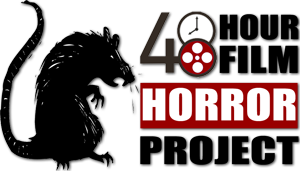 Working in film often means working long hours to meet tight deadlines, and choosing not to allow technical difficulties or other challenges to weaken your resolve. Film Connection apprentice Keith Huff, who apprentices at American Recording Co. in Louisville, KY, recently got a crash course in these truths when he participated with his mentor Herschel Zahnd on a short called BainBridge for the 48 Hour Horror Film Project.
As the name suggests, the 48 Hour Horror Film Project is an offshoot of the broader 48 Hour Film Project, except with a horror theme. Entrants are given a character, a prop and a line of dialogue, and are expected to complete all aspects of the film within 48 hours. Working under this deadline means the pressure is on to get everyone where they need to be while keeping things moving as smoothly as possible.
Working in film often means working long hours to meet tight deadlines, and choosing not to allow technical difficulties or other challenges to weaken your resolve. Film Connection apprentice Keith Huff, who apprentices at American Recording Co. in Louisville, KY, recently got a crash course in these truths when he participated with his mentor Herschel Zahnd on a short called BainBridge for the 48 Hour Horror Film Project.
As the name suggests, the 48 Hour Horror Film Project is an offshoot of the broader 48 Hour Film Project, except with a horror theme. Entrants are given a character, a prop and a line of dialogue, and are expected to complete all aspects of the film within 48 hours. Working under this deadline means the pressure is on to get everyone where they need to be while keeping things moving as smoothly as possible.
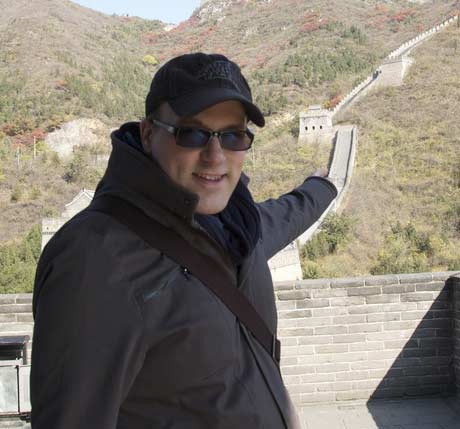 “The project was fast, and you had to be prepared,” says Keith. “My first job was to sign everyone in and get the location and music release forms organized. Then I was working as a producer/PA. I did the jobs that were assigned to me, then took initiative to get other jobs done without permission. Nobody said anything, so I guess I was doing everything right.”
The tight deadline also makes for some interesting experiences. For a complicated sword vs. torch fight scene, the actors had only 10 minutes to practice the fight scene before they shot it. Mentor Herschel Zahnd says the time constraint meant having to do things without the luxury afforded most standard film productions today. “We had to do the fight scene with a real flaming torch because we didn’t have the time to add flames in post-production the way you usually would in film,” says Herschel. “We were very fortunate—both actors had extensive training in combat, swordplay, and stunt work. This allowed us to pull off the scene safely and effectively. Even under a time crunch, safety first!”
Although it was a lot of work crammed into a short time, Keith says the experience just reaffirmed his commitment to the craft. “I was having too much fun for this to have been a job or school,” says Keith. “Everything felt natural and familiar to me. Even when we encountered problems, I was fast to react and fix the situation.”
The biggest of those problems happened during post-production. Keith recalls, “I went home and crashed for four hours until I got the terrifying call that our editors were kicked out of their editing location and our backup computer had crashed. I returned Sunday morning where I watched the final pieces of the film being cleaned up.”
“The project was fast, and you had to be prepared,” says Keith. “My first job was to sign everyone in and get the location and music release forms organized. Then I was working as a producer/PA. I did the jobs that were assigned to me, then took initiative to get other jobs done without permission. Nobody said anything, so I guess I was doing everything right.”
The tight deadline also makes for some interesting experiences. For a complicated sword vs. torch fight scene, the actors had only 10 minutes to practice the fight scene before they shot it. Mentor Herschel Zahnd says the time constraint meant having to do things without the luxury afforded most standard film productions today. “We had to do the fight scene with a real flaming torch because we didn’t have the time to add flames in post-production the way you usually would in film,” says Herschel. “We were very fortunate—both actors had extensive training in combat, swordplay, and stunt work. This allowed us to pull off the scene safely and effectively. Even under a time crunch, safety first!”
Although it was a lot of work crammed into a short time, Keith says the experience just reaffirmed his commitment to the craft. “I was having too much fun for this to have been a job or school,” says Keith. “Everything felt natural and familiar to me. Even when we encountered problems, I was fast to react and fix the situation.”
The biggest of those problems happened during post-production. Keith recalls, “I went home and crashed for four hours until I got the terrifying call that our editors were kicked out of their editing location and our backup computer had crashed. I returned Sunday morning where I watched the final pieces of the film being cleaned up.”
 Herschel continues, “We got everything done with just enough to render one version of the film. Unfortunately, a massive crash prevented us from crossing the finish line until 30 minutes past the time limit. But we still made an amazing film that the whole team is proud of, and we’re still eligible for the Audience Choice Award.”
Despite the technical difficulties that prevented them from turning the film in on time, the silver lining is that the team decided to expand the film into a six-part web series to be filmed in the spring/summer of 2015. “Everyone was so excited by the idea that by the end of the 48 we had all decided there was a great deal more story there to tell,” says Herschel. Meanwhile, Keith’s initiative so impressed his mentor that he will be staying on as a producer of the expanded project!
As Keith Huff learned firsthand from this experience, when filmmakers don’t allow difficulties to weaken their commitment, even challenges and failures can turn into opportunities. Keith’s dedication on a short-term project has led to an expanded role in an even bigger project with his mentor. Way to go, Keith!
Herschel continues, “We got everything done with just enough to render one version of the film. Unfortunately, a massive crash prevented us from crossing the finish line until 30 minutes past the time limit. But we still made an amazing film that the whole team is proud of, and we’re still eligible for the Audience Choice Award.”
Despite the technical difficulties that prevented them from turning the film in on time, the silver lining is that the team decided to expand the film into a six-part web series to be filmed in the spring/summer of 2015. “Everyone was so excited by the idea that by the end of the 48 we had all decided there was a great deal more story there to tell,” says Herschel. Meanwhile, Keith’s initiative so impressed his mentor that he will be staying on as a producer of the expanded project!
As Keith Huff learned firsthand from this experience, when filmmakers don’t allow difficulties to weaken their commitment, even challenges and failures can turn into opportunities. Keith’s dedication on a short-term project has led to an expanded role in an even bigger project with his mentor. Way to go, Keith!
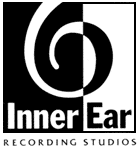 The Recording Connection partners with some of the biggest names in the music industry to teach our students—none more so than Don Zientara, who has been a mentor with us for many years. Producer, engineer and owner of Inner Ear Studio in Arlington, Virginia, Don has played a major role in the Washington, D.C. music scene where funk and punk collide. A recent article from Rolling Stone says, “One man’s name is on almost every single landmark hardcore D.C. album: Don Zientara.” That’s not an exaggeration: Don’s name appears on literally hundreds upon hundreds of hardcore and post-punk record credits, including Fugazi, Bad Brains, Minor Threat, Scream, Government Issue and Möbius Strip.
The Recording Connection partners with some of the biggest names in the music industry to teach our students—none more so than Don Zientara, who has been a mentor with us for many years. Producer, engineer and owner of Inner Ear Studio in Arlington, Virginia, Don has played a major role in the Washington, D.C. music scene where funk and punk collide. A recent article from Rolling Stone says, “One man’s name is on almost every single landmark hardcore D.C. album: Don Zientara.” That’s not an exaggeration: Don’s name appears on literally hundreds upon hundreds of hardcore and post-punk record credits, including Fugazi, Bad Brains, Minor Threat, Scream, Government Issue and Möbius Strip.
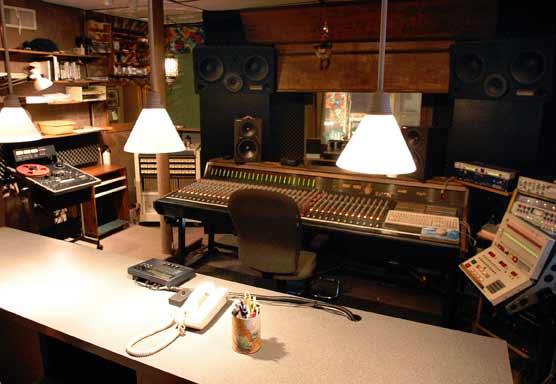 Don’s recent honorable mention in the Rolling Stone piece stems from coverage of another major act with ties to his studio: Foo Fighters. It turns out that frontman Dave Grohl grew up in the D.C. area (not in Seattle, where many people mistakenly associate him), and in an earlier time, Don even recorded Grohl on drums with D.C. band Scream. So when Foo Fighters came to Inner Ear to record “The Feast and the Famine” for their upcoming eighth album Sonic Highways, it was something of a homecoming for Grohl. The band’s D.C. connection was recently featured in the HBO documentary series Foo Fighters Sonic Highways (created by Grohl in tandem with the upcoming album), and Don was even interviewed by Grohl himself for the series.
Don tells RRF that having Foo Fighters in the studio, recording and filming for a week was “total madness in a good way. They were editing and recording, there was a makeup person, camera guys, the whole film crew and there was the band, the musicians and lots and lots of equipment.”
Although he’s got decades of experience, Don says he never stops learning. Even while recording with Foo Fighters (a band Don describes as “very professional” and great to work with), he says, “I got more stuff to add to my bag of tricks.” Perhaps it’s this combination of skill, humility and openness that has helped Don become a legend in the rock/punk scene—a top-shelf engineer who is sought out by bands like Foo Fighters.
Despite the punk status, Zientara’s the first to say he isn’t exclusive to rock or punk. In fact, Inner Ear has recorded everything from Celtic folk and world to classical, jazz and blues and even spoken word.
Don’s recent honorable mention in the Rolling Stone piece stems from coverage of another major act with ties to his studio: Foo Fighters. It turns out that frontman Dave Grohl grew up in the D.C. area (not in Seattle, where many people mistakenly associate him), and in an earlier time, Don even recorded Grohl on drums with D.C. band Scream. So when Foo Fighters came to Inner Ear to record “The Feast and the Famine” for their upcoming eighth album Sonic Highways, it was something of a homecoming for Grohl. The band’s D.C. connection was recently featured in the HBO documentary series Foo Fighters Sonic Highways (created by Grohl in tandem with the upcoming album), and Don was even interviewed by Grohl himself for the series.
Don tells RRF that having Foo Fighters in the studio, recording and filming for a week was “total madness in a good way. They were editing and recording, there was a makeup person, camera guys, the whole film crew and there was the band, the musicians and lots and lots of equipment.”
Although he’s got decades of experience, Don says he never stops learning. Even while recording with Foo Fighters (a band Don describes as “very professional” and great to work with), he says, “I got more stuff to add to my bag of tricks.” Perhaps it’s this combination of skill, humility and openness that has helped Don become a legend in the rock/punk scene—a top-shelf engineer who is sought out by bands like Foo Fighters.
Despite the punk status, Zientara’s the first to say he isn’t exclusive to rock or punk. In fact, Inner Ear has recorded everything from Celtic folk and world to classical, jazz and blues and even spoken word.
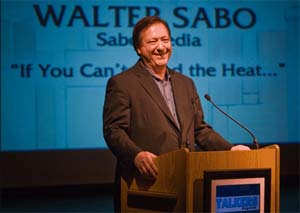 Brian Kraft is heading to the Radio Ink conference with this legend — Walter Sabo, the youngest ever Vice President in the history of ABC and NBC Incorporated, landing both posts before the age of 30. President of Sabo Media since 1984, Sabo now works as a leader in media programming, marketing, management and consultation for companies including Sirius Satellite Radio, Viking Publishing, iHeart Media, AMC Movie Theatres, Entercom and many others.
Held annually in New York City, Radio Ink is the radio broadcast industry’s largest event, nearly all the players in radio are there, from legends like Sabo, to trendsetters, on-air personalities and CFOs.
Brian’s there too, making connections with even more of the biggest pros in radio!
Brian Kraft is heading to the Radio Ink conference with this legend — Walter Sabo, the youngest ever Vice President in the history of ABC and NBC Incorporated, landing both posts before the age of 30. President of Sabo Media since 1984, Sabo now works as a leader in media programming, marketing, management and consultation for companies including Sirius Satellite Radio, Viking Publishing, iHeart Media, AMC Movie Theatres, Entercom and many others.
Held annually in New York City, Radio Ink is the radio broadcast industry’s largest event, nearly all the players in radio are there, from legends like Sabo, to trendsetters, on-air personalities and CFOs.
Brian’s there too, making connections with even more of the biggest pros in radio!

 At RRF we believe the greatest wisdom in the world benefits no one if it is not shared and made useful.
We work hard to stay on the cutting-edge of mentor-led education. The more we know about YOU, the better equipped we are to create the tools that will help you hone your craft and break you in to the industry you want to work in!
Please help us continue in our mission by taking the survey found here.
At RRF we believe the greatest wisdom in the world benefits no one if it is not shared and made useful.
We work hard to stay on the cutting-edge of mentor-led education. The more we know about YOU, the better equipped we are to create the tools that will help you hone your craft and break you in to the industry you want to work in!
Please help us continue in our mission by taking the survey found here.



RRFC is education upgraded for the 21st century.
Get the latest career advice, insider production tips, and more!
Please fill out the following information, and RRFC Admissions will contact you to discuss our program offerings:
Stay in the Loop: Subscribe for RRFC news & updates!
© 2025 Recording Radio Film Connection & CASA Schools. All Rights Reserved.


